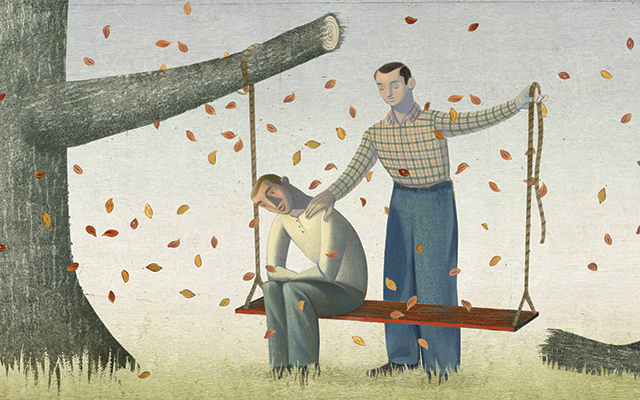My mother died suddenly in her sleep when she was 57. It felt like my world was on fire; a white-hot sensation coursed through my body. In the following days, my mind grappled continuously with a swirl of thoughts and feelings around the complexities of our relationship, and my childhood.
Like everyone who suffers such a loss, I had entered the stark terrain of grief. What I hadn’t anticipated was the intensity of the journey I had begun and where it would lead. It’s been more than a decade now since her death, but I feel its reverberations in the grief we share as a society in the midst of the pandemic and all the upheaval that has accompanied it.
Grief can transform us. In a way, this is inevitable, because it has immediate and physical repercussions. In a 2019 study, researchers took blood samples from grieving individuals about three months after their spouses had died. The greater the severity of their bereavement, the higher the markers related to systemic inflammation. Two other studies have linked higher scores on grief assessments to cardiovascular clotting and other risk factors for heart disease.
Intense grief is one of the most challenging aspects of the human experience, and many of us can get mired in its difficulties. Yet our losses can also afford us opportunities for growth and understanding, especially when we’re able to find meaning in our grief rather than negating it or casting it aside. Honoring loss can allow it to lead to something different — and that process will be as unique to each individual as a fingerprint.
From Denial to Acceptance
On Death and Dying, the influential book by the Swiss American psychiatrist Elisabeth Kübler-Ross, MD, introduced her theory of the five stages of grief: denial, anger, bargaining, depression, and acceptance.
These five stages likely resonate with almost anyone who’s experienced grief, from the initial shock to grasping the irreversibility of the loss. The stages can also feel alienating, because mourning rarely follows a neat trajectory.
Yet Kübler-Ross never meant for the stages to be perceived as a set of orderly steps. She was dismayed by how the framework was often presented as a sequential description of something we usually experience in a more elliptical way.
“They’re not a map, they’re not linear,” says death and grief expert David Kessler, who worked closely with Kübler-Ross. “There’s no one way to grieve, and there’s more to death and grief than just the five stages.”
Kessler’s life work as a grief specialist began with the traumatic death of his mother when he was 13: As she died, there was a fire and shooting in the hotel across the street from the hospital.
He went on to forge a friendship and professional relationship with Kübler-Ross, and the two collaborated on the book On Grief and Grieving just before Kübler-Ross’s death in 2004. Kessler’s work still involves helping people understand that the fifth stage of grief — acceptance — doesn’t imply that grief one day vanishes for good.
“There is no end to grief,” he explains. “When people ask me, ‘How long will I grieve for my wife or my sister or my husband?’ I always say, ‘How long is that person going to be dead? If they’re going to be dead for a long time, you’re going to grieve for a long time.’ But that doesn’t mean you always grieve with pain.”
The common oversimplification of Kübler-Ross’s five stages as linear can lead to unrealistic expectations — including the feeling that you might not be grieving correctly, or that you are falling short if you haven’t attained total closure on your loss.
Complete closure after loss is an unrealistic expectation — and it’s impossible when a loss remains indeterminate. Pauline Boss, PhD, emeritus professor of family therapy at the University of Minnesota, calls such loss “ambiguous loss.” It includes experiences such as watching a spouse or parent suffer cognitive decline, or having a loved one go missing.
It can also be provoked by losing one’s home to a war or a disaster, a loss that never really ends.
Boss agrees with Kessler that although grief doesn’t come with an expiration date, we still need to find a way to move forward with it as a part of our lives.
“Many people can’t find closure, nor do they want it,” she says. “It’s a cultural idea unique to the United States, I think, that we have to get over grief. But the research shows that people can live with grief and loss and still have a good life.”
“Grief comes in waves, or oscillations, as an engineer might call them, that hopefully get farther and farther apart as time goes on,” Boss observes. “But even after 20 years you might see or hear something that makes you tear up. That’s normal grief.”
The Sixth Stage
For all the value of Kübler-Ross’s five stages, even when they’re understood as nonlinear, those who have lived with sustained grief might have still felt there was something missing in the framework. For Kessler, this was brought home in tragic fashion.
“After all my experience working with grief, a few years ago my younger son died, accidentally and out of the blue,” he recounts. “And, you know, it was just brutal. I found myself wanting to write a note to everyone I had counseled, saying, ‘I forgot how bad the pain is.’”
Kessler canceled his talks and engagements. While he was retreating in his grief, he came across a draft of his own unpublished writing that linked grief to meaning. At first, he was skeptical of his own insights, but as he talked with others who had experienced similarly deep, wrenching loss, the idea took hold.
“I learned that, for me, I couldn’t stop with that fifth step of acceptance. It just wasn’t enough,” Kessler says. “I need more, and meaning was the ‘more’ I needed.”
Kübler-Ross’s family granted Kessler permission to add “meaning” as a stage to her model, and he published Finding Meaning: The Sixth Stage of Grief in 2019.
“When working with people whose loved ones have died, I often see how hard they search for meaning,” he writes. “It doesn’t matter whether the death occurred after a long, debilitating illness or if it came as a total shock after an accident. There’s often a desire to see meaning in it.”
Finding that sense of meaning amid the pain of grief is no small order, of course. It doesn’t happen in a flash of insight — nor can we expect it to. Meaning is not a goal to be achieved on deadline, or another cause of disappointment and remorse. We need to be both gentle with ourselves and humble.
“After a loss, you can’t have meaning without hope. They’re inextricably tied together,” says Boss. “Along with discovering that new hope, we have to check our desire for mastery and being in control of the situation. Once you have a loss, you’re not in control. And while some cultures are more mastery-oriented than others, ours is very high on that value.”
The Meaning-Making Process
Grief has a way of shattering the narrative that enables us to handle the day-to-day. It reshapes our inner dialogues, assumptions, and stories. Few would choose loss as the catalyst for a search for meaning, but for grief to be processed in a healthy way, we have to allow ourselves to dig deep — and to grow.
“There is a concept called posttraumatic growth, which occurs after a terrible loss, adversity, or trauma in life,” says Emily Esfahani Smith, author of The Power of Meaning: Finding Fulfillment in a World Obsessed With Happiness. “People who grow tend to spend time thinking about what happened, trying to make sense of it, not shying away from the sadness and the pain but leaning into it. This is a natural, adaptive process. It’s a good way to handle things, if the other option is to give in to despair.”
Esfahani Smith defines four crucial elements for the way humans create meaning in their lives: belonging, purpose, storytelling, and transcendence. By integrating a feeling of community with a daily mission, wed to a positive narrative about our lives and a sense of connection to something larger than ourselves, we alchemize a way forward.
This is a process. It could mean dedicating energy to a nonprofit that produces life-saving research that would have helped your loved one, or doing some kind of volunteer work to honor their passions. But creating meaning doesn’t always have to involve a major project.
“Meaning is also found in the small moments,” Kessler observes. “The big things are nice, but meaning is also found in those little moments.”
This requires remaining open to your feelings. Relish a memory in its bittersweetness, make a toast of commemoration, or just allow grief to flow unchecked for a few moments. These all contribute to the meaning-making process. Along the way, we start to learn how to feel and honor the many griefs we all carry, big and small.
“I talk about macro grief and micro grief, and I think it’s all the death of something — a person, a relationship, a job, and even the world before the pandemic,” says Kessler. “There are all kinds of grief, and we want to compare them.
“But grief is of the heart, and not the mind. You don’t have a broken mind. You have a broken heart. When we compare them, when we’re in judgment, we wonder who has the worse grief. Well, the worst grief is always yours.”
Adaptation Takes Time
Kessler’s “sixth stage,” or the process of finding meaning in grief, is like the original five stages — nonlinear and unpredictable. The meaning we find can also change over time.
Although Boss herself doesn’t subscribe to the idea that grief comes in stages, she does agree with Kessler that viewing the grief process as one of continual adaptation can keep us from becoming stuck in our suffering.
“You even have to change your identity after a loss,” says Boss. “This can be a big one. After my husband died, for instance, I was filling out a legal form and I had to check whether I was married, divorced, or widowed. That was kind of a shock to me, seeing my identity changing in that way.”
Reckoning with conflicting emotions is essential to creating meaning, she adds. We are all likely to experience at least some feelings of ambivalence about the person we lost — no relationship is completely positive or easy.
“For most of us, there’s a little bit of love and hate in our relationships,” she points out. “It’s hardest of all to reconcile ourselves to that after someone has died because of the guilt that comes along with it. For every loss there is some guilt, even if it’s irrational. And then you hear a lot of ‘I should have, I could have, what if I had done that differently?’”
Yet it’s key to integrate memories that might be painful into the process of creating meaning, notes Kessler. “It is important to tell their stories honestly, without trying to censor the bad parts.”
Keeping it real allows both sweet and painful memories to exist within a larger context; it also permits the person we lost to be whole. Their life encompasses more than its worst moments, says Kessler.
In grief we often discover that multiple realities exist at once. We may feel a profound pain of loss for someone who was unkind to us. We might feel guilt over how our life has been improved by a beloved’s absence. In many cases, the pain of loss can be mixed with anger, disappointment, and frustration.
Part of moving toward meaning involves accepting these contradictions and reaching a point where our own stories of loss can encompass them.
“There is so much research that reveals how the narratives, the stories we tell in our minds, shape our reality,” says Esfahani Smith. “Some people can get stuck in negative narratives, while others find stories about their lives that are redemptive and centered around growth and love — these people tend to experience greater meaning in life.”
Seeking out positive narratives doesn’t mean erasing our pain, minimizing the depth of our love, or diminishing the importance of the person we’ve lost. Discovering positive meaning in the loss of a loved one can be a way of honoring them. Boss recounts the story of how a woman she worked with was able to shift the meaning of her loss after her husband’s death in the 9/11 attacks.
“She was very distraught. She felt it was her fault that her husband died. He had overslept that day and should have been out of the building when the airplane struck,” Boss recounts. “Much later the woman said, ‘Do you remember that story about how my husband overslept and it was my fault he died because I didn’t wake him? I see it differently now. He always set the alarm himself. He just wanted another hour to spend with me and our family before he died.’”
Memory and Memorial
For nearly two years, the pandemic has wrought profound losses in lives, connections, careers, and ways of living, all over the world. Though we all experience these losses uniquely, we now have grief in common.
“It feels like the world has been catching up with my conversation around grief,” Kessler says. “It’s not that I’ve discovered so much new to say, but it’s something we avoided talking about before. Now we’re all collectively talking about it. I hope this opening doesn’t close. We’re such a grief-illiterate society.”
Some of us do maintain public grief rituals, such as the Jewish tradition of sitting shiva, or the Irish wake. These acts create space and time to recognize loss with the support of others.
One study also discovered that private rituals, such as going to a particular place on a certain day, or following a familiar routine, connect grieving people to their loved ones in a way that provides meaning and solace.
Over time, we can each find our own rituals that maintain our connections and honor our losses. For one person, it may be launching a nonprofit; for another, it’s a daily walk.
Following the death of his beloved daughter Sophie from influenza in the pandemic of 1918 to 1920, Sigmund Freud, the father of psychoanalysis, carried a locket containing her picture. “No matter what may come to take [grief’s] place, even if it should fill that place completely, it yet remains something else,” he wrote in a letter on his late daughter’s birthday, years after her death. “And that is how it should be. It is the only way of perpetuating a love we do not want to abandon.”
In my own experience, the premature loss of my mother compelled me to reflect on the complicated and contradictory feelings and experiences I had had with her throughout my life, including painful reckonings that sometimes clouded my love for her. After a number of years, I pursued a specific therapy geared toward addressing negative experiences from early childhood.
It was like a cloud lifted for me. In healing myself, I came to realize, I was also healing her — or healing the part of me that I shared with her. It was grounded in love, and it was meaningful.
Meaning and Loss
Death and grief expert David Kessler, author of Finding Meaning: The Sixth Stage of Grief, explains what meaning is and is not, with regard to grief.
- Meaning is relative and personal.
- Meaning takes time. You may not find it until months, or even years, after a loss.
- Meaning does not require understanding. Understanding isn’t necessary.
- Even when you do find meaning, you will not feel that it was worth the cost of what you lost.
- Your loss is not a test, a lesson, or something to handle. It is also not a gift.
- Only you can find your own meaning.
- Meaningful connections can heal painful memories.





This Post Has 2 Comments
What is delayed grief? My father was a raging alcoholic who physically, emotionally and verbally abused me. He committed homicide and Suicide at the same time in a small upper class town. We had to leave everything and move cross country. I still have mixed feelings about his death. Sometimes I feel relief, sometimes sadness. What I think I grieve most is the absence of a childhood that prepared me for adulthood. The fear of abandonment runs my life. He left a sick and dying wife with 4 daughters and very limited finances. I seldom talk about it to anyone except my therapist, which helps but how do you find meaning in complicated grief? Any suggestions would be greatly appreciated. Thank you
As a hospice volunteer, I found this article truly helpful, and meaningful.